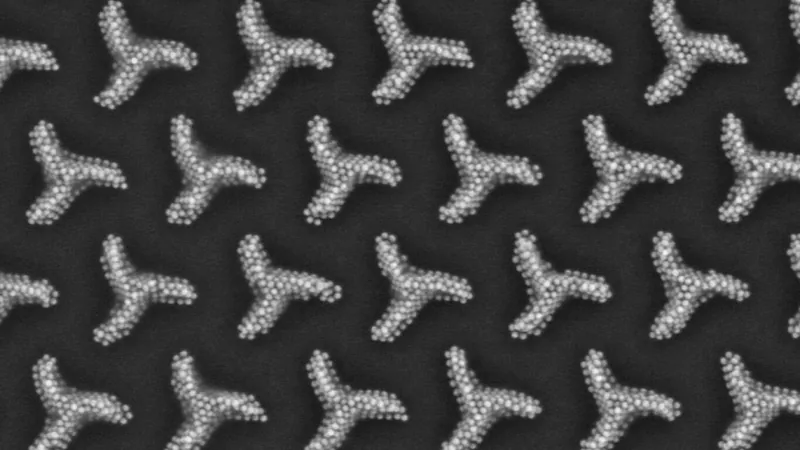
Australia: Pioneering the Digital Health Revolution
2025-03-28
Author: Rajesh
Australia: Pioneering the Digital Health Revolution
At the forefront of a digital health transformation, the Australian e-Health Research Centre (AEHRC) recently hosted its 21st Annual Research Colloquium, bringing together over 300 experts and innovators to delve into the latest trends shaping healthcare. This unprecedented event highlighted groundbreaking research in areas such as AI-driven vaccine development and wastewater pathogen detection, setting the stage for a future where public health is more proactive than reactive.
The COVID-19 pandemic emphasized the critical nature of timely pathogen detection and prevention measures. In response, AEHRC researchers are developing cutting-edge digital solutions to tackle these public health challenges. One notable focus is antimicrobial resistance, a growing concern that threatens effective treatment for common infections. Researchers, including Aminath Shausan, are investigating resistance patterns in remote areas of Australia to enhance surveillance and response strategies.
In a further stride towards safeguarding health, Laurence Wilson’s team is utilizing artificial intelligence to analyze immune responses to vaccines like those for COVID-19 and influenza. By pinpointing optimal vaccine targets within pathogen genomes, they aim to create vaccines that are not only more effective but also tailored to enhance public health outcomes.
AEHRC's contributions extend beyond vaccines; innovative infection control platforms are being developed to analyze real-time data, enabling public health authorities to simulate outbreak scenarios and respond more nimbly to threats. A standout project led by Jatinder Sidhu focuses on monitoring wastewater for viral pathogens—an initiative that promises to expedite the detection of emerging viruses and enhance rapid public health interventions.
The integration of AI and machine learning into healthcare practices is revolutionizing diagnostics and treatment. One exciting advancement springs from the work of Pierrick Bourgeat’s team, which is enhancing the analysis of positron emission tomography (PET) images. These advancements could lead to earlier diagnoses of conditions like Alzheimer’s, paving the way for timely interventions that may slow disease progression.
Another promising development comes from Maria Antico, who is collaborating with the Queensland University of Technology to introduce wearable ultrasound technology. This innovative, AI-powered device allows users to interpret ultrasound images remotely, significantly improving access to diagnostic tools—both on Earth and in possible future extraterrestrial missions.
Moreover, effective healthcare data exchange is fundamental to improving patient care. Liesel Higgins presented important findings from AEHRC’s "Australia’s Aged Care Data Landscape" report, pinpointing data interoperability challenges within the aged care sector. Addressing these gaps is crucial for integrating data systems and enhancing accessibility for healthcare providers.
John Grimes’ team, in their efforts to combat cardiovascular disease—a leading cause of death in Australia—is integrating risk assessment tools into general practice systems, streamlining prevention efforts.
Given Australia’s diverse population, tailored healthcare solutions are paramount. AEHRC’s Indigenous Health Team has developed Kara-Care, a digital tool designed specifically for Aboriginal communities. This innovative platform optimizes healthcare delivery by simplifying access to health data, thereby enhancing efficiency for clinicians and reducing the burden on patients.
As digital health technologies continue to evolve, AEHRC’s implementation scientists focus on ensuring that these innovations have real-world impacts. By certifying software as medical devices and meeting rigorous quality standards, AEHRC is paving the way for technologies that are not only effective but ready for market deployment.
The insights and innovations showcased at this year's colloquium underscore a vibrant future for digital health in Australia. With research and technologies advancing rapidly, the vision for a healthier, more connected future is not just a dream—it's becoming a reality. Are we on the brink of a health revolution? Only time will tell!

 Brasil (PT)
Brasil (PT)
 Canada (EN)
Canada (EN)
 Chile (ES)
Chile (ES)
 Česko (CS)
Česko (CS)
 대한민국 (KO)
대한민국 (KO)
 España (ES)
España (ES)
 France (FR)
France (FR)
 Hong Kong (EN)
Hong Kong (EN)
 Italia (IT)
Italia (IT)
 日本 (JA)
日本 (JA)
 Magyarország (HU)
Magyarország (HU)
 Norge (NO)
Norge (NO)
 Polska (PL)
Polska (PL)
 Schweiz (DE)
Schweiz (DE)
 Singapore (EN)
Singapore (EN)
 Sverige (SV)
Sverige (SV)
 Suomi (FI)
Suomi (FI)
 Türkiye (TR)
Türkiye (TR)
 الإمارات العربية المتحدة (AR)
الإمارات العربية المتحدة (AR)